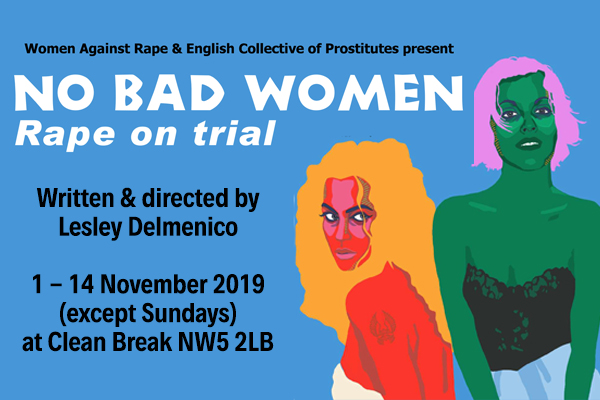DIVA: Theatre review – No Bad Women

A harrowing watch, but an important one, says Jane Fae
BY JANE FAE
There must be cheerier ways to pass a Saturday night than at a play about the real life events surrounding a long ago rape trial. Catching the latest Ken Loach, perhaps. Or listening to the collected speeches of Nigel Farage.
But if you can stand it – and it is, in several places, a harrowing watch – then No Bad Women is an important, eye-opening, gripping work about the nature of sexual violence and the ways in which the legal system works to deny justice to women.
And not just in all the ways we usually talk about: the obstacles to getting a case to court; the risk that the trial of an assailant will subtly (and sometimes not so subtly) turn to an inquisition on the life style of the victims.
Here, the complainants, the Bad Women, are the lowest of the low in the eyes of the law. Sex workers. Prostitutes. If they did not quite deserve what happened – and it is clear that not a few of those involved likely harboured such thoughts – still: their evidence must be subject to greater disbelief, their character dissected and torn apart in ways that the alleged assailant escapes.
The play is based on real life events. In 1991, a 44-year-old man, from Margate, Kent, raped and indecently assaulted one woman, after holding her at knifepoint and tying her up. A year later, he sexually assaulted a second, in very similar fashion. You can read about the case here – or if you are planning on going to see the play, perhaps catch up after.
It was a horrific crime and, later revealed, not the only crime of this type that he had committed. The problem? His victims were sex workers. Calculatedly so: for the perpetrator well understood that in selecting such targets he was also insulating himself against being caught at multiple levels. Would they dare report the assault? Would the police take them seriously if they did? And if by some miracle the case ever got to court, would they not be shredded by hostile cross-examination?
He was not wrong. Police were reluctant to investigate. The Crown Prosecution Service declined to prosecute. And when finally the case got to court in 1995, by way of a historic private prosecution supported by the English Collective of Prostitutes, Women Against Rape, and lawyers working pro bono, the defence barrister went after the women. He questioned their morals, motives and truthfulness. Again and again one the audience must remind themselves that THEY were not the ones on trial.
The reality, according to writer and director Lesley Delmenico, was every bit as horrific as her play portrays. Perhaps worse. Lesley, who teaches theatre and directing at Cornell College in Iowa, first came across this story at an event put on by the Crossroads Women’s Centre in London. She asked if she could do more to help: they responded with a box load of transcripts from the trial and, a while later, this play was the result.
She was, she tells me: “Struck by how horrible the trial was… the things said. And the sub-text: that if you are a prostitute you can’t be raped, can’t be believed.”
Her decision to put the play on again was influenced in no small part by watching the confirmation hearing for Brett Kavanagh to the Supreme Court. She adds: “In the age of #MeToo and Time’s Up this is the right time”.
It is an incredible accomplishment: one that I doubted was possible. Because, if you have ever sat through a major criminal trial you will know how frustrating, meandering, opaque they can appear. I wondered whether Lesley could reduce days of such stuff to anything meaningful without lapsing into preachiness.
Yet she has succeeded, capturing the essence of the case in a performance lasting a little over an hour, rather than setting out to recreate the procedural miasma that a longer, more exact retelling would involve. I guess some lawyers might object that this is not how real trials work. They would be right: but missing the point.
It is also well-suited to the venue – Clean Break, a feminist theatre company based in Kentish Town – which, due to the fact that it is small, intimate, draws the audience in to the drama, co-opts us, almost, as jury.
Creds too to all the cast: a company of nine in which all bar three, the two victims and one other character are men. Because that is how we try rape in the UK, in most countries: men sitting in judgment on women.
All are excellent. But for quality of acting, an immense thumbs up to the two leading women, Maria Lovelady and Stephanie Noblet, delivering stellar performances around emotionally taxing material.
Well done, too, Christopher Poke – if it is possibly appropriate to say such a thing – for his vivid, hateful depiction of Defence Counsel, tasked with tearing the women’s testimony to shreds.
There is still time to catch this play (it is on til 14 November). Book online rather than taking the risk of turning up without tickets.
And it goes without saying: if you have been subject to sexual violence or may be triggered by same, you need to think twice about coming. If you do, make sure you bring a friend and are supported afterwards.
But still, a very worthwhile watch.
No Bad Women runs until 14 November 2019. Book online now at brownpapertickets.com.
Theatre review: No Bad Women
